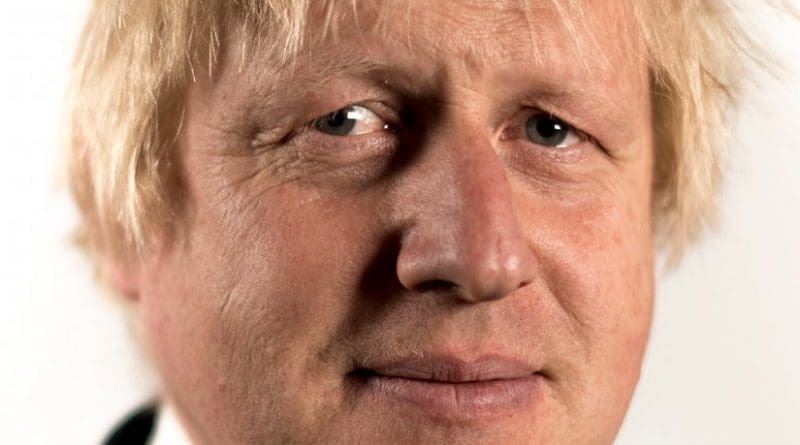Brexit To Define Johnson’s Premiership – OpEd
By Arab News
By Cornelia Meyer*
Ninety-nine will be a defining number for the new prime minister of the UK, for it is exactly that many days between Boris Johnson assuming his post on Wednesday and Oct. 31, the scheduled date for Brexit. During the leadership debates, he promised he would take Britain out of the EU with or without a deal on that date.
Johnson gave a magnanimous and rousing acceptance speech. He thanked Jeremy Hunt for being a formidable but good-natured adversary. He also thanked his predecessor, Theresa May. He went on to declare that he was going to deliver Brexit, unite the country and defeat Labour leader Jeremy Corbyn. He oozed optimism and vowed to energize the country.
Johnson won just over 92,000 votes, a two-thirds majority. It might be decisive, but the Conservative Party base that anointed him represents less than 2 percent of the country’s electorate. This could well come back to haunt him when the going gets tough; and tough it will get. There is not just Brexit on his plate; there are also numerous campaign promises in need of funding.
Like so often when a new leader assumes the highest executive office, events divert the focus. In this case, it is the standoff with Iran over the seizure of the British-flagged oil tanker Stena Impero by Iran’s Islamic Revolutionary Guard Corps. The outgoing government distanced itself from US President Donald Trump’s policy of maximum pressure, opting instead for a naval alliance with France, Denmark and Italy to protect vessels in the Strait of Hormuz. What will Johnson do? As foreign secretary, he made a trip to the US to try and convince Trump to remain in the Iran nuclear deal. However, Johnson is close to Trump, who repeatedly told the world that Johnson would make a great prime minister. He even told May so. In view of Brexit, Johnson needs the “special relationship” with the US and a trade deal, which might inform his stance on Iran. Conversely and also in view of Brexit, he may not want to tear down all ideological and foreign policy bridges to the EU. We shall see how events unfold.
Brexit will define his premiership. As the French say, the more things change, the more they stay the same. Johnson may have won decisively among the Tory party faithful, but the numbers in the House of Commons have not changed. The Conservatives command a slim working majority of two, which may be redcued to one depending on the outcome of a by-election in August. This wafer-thin majority depends on a confidence-and-supply agreement with Northern Ireland’s Democratic Unionist Party (DUP). Johnson held talks with DUP chief Arlene Foster, who said she would leave the arrangement in place but review it. Read: The DUP will try and extract more money for Northern Ireland. It will also exert pressure for the Irish backstop to be dropped from the withdrawal agreement (the UK-EU divorce agreement struck by May). As the name suggests, the DUP stands for the Union between Northern Ireland and Great Britain, fearing that the province will be treated differently from the rest of the UK because of the backstop.
The real change is that the erstwhile establishment, which favored leaving with a deal, will now become the backbenchers. The hard-liners will become the new establishment. The prime minister is, among others, supported by Jacob Rees Mogg’s European Research Group, whose members are the uber-Brexiteers that favor a no-deal Brexit. Whichever way the new prime minister turns on the thorny Brexit issue, he will find it excruciatingly hard to gain a majority in Parliament. The only thing MPs seem to agree on is that they do not want a no-deal Brexit. The Cabinet will not necessarily concur.
A lot will depend on what the new Cabinet will look like. Johnson is said to want it to be more reflective of modern Britain, so it should include more women and ethnic minorities. Expect figures like Priti Patel, Alok Sharma and Sajid Javid to feature prominently.
When it comes to Brexit, things will not be easy. EU leaders have made it clear that they are happy to renegotiate the political declaration, which informs the negotiations on the future relationship post-Brexit. The withdrawal agreement, however, is not up for negotiation. EU Chief Negotiator Michel Barnier said that he would work “constructively” with Johnson to “facilitate the ratification of the withdrawal agreement;” meaning he will not open it up for renegotiation. The incoming European Commission President Ursula von der Leyen said that the new prime minister faced “challenging times.” Therein lies the problem: What Johnson wants may not be on offer and all key positions in the EU will change over between Nov. 1 and Dec. 1. In other words, the UK will negotiate with a lame-duck institution awaiting major changes. This does not bode well for achieving a negotiated deal by Oct. 31.
The questions on everybody’s mind are: Will Johnson really make good on his promise to leave by Oct. 31, deal or no deal? How would his allies in the party react if he delayed Brexit? Will he prorogue Parliament to force through a no-deal Brexit? Will he go for new elections or will Parliament’s proponents of a second referendum get their way? There are a lot of questions and no clear answers.
In the meantime, uncertainty will prevail, which is neither good for sentiment nor the economy. Let us hope that the fog will soon lift and we will see on which course the nation will embark under its new captain.
- Cornelia Meyer is a business consultant, macro-economist and energy expert. Twitter: @MeyerResources

